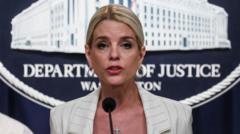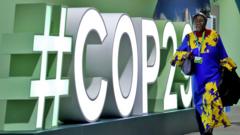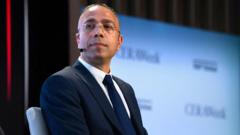Kirsty Coventry, an acclaimed swimmer, has been elected as the first woman and African president of the International Olympic Committee (I.O.C.), succeeding amidst a backdrop of urgent issues in global athletics.
Kirsty Coventry Makes History as First Female President of the I.O.C.

Kirsty Coventry Makes History as First Female President of the I.O.C.
The Olympic movement welcomes a transformative leader facing pressing challenges in sports diversity and climate governance.
The recent election of Kirsty Coventry, a distinguished Olympic swimmer from Zimbabwe, as the new president of the International Olympic Committee (I.O.C.) marks a historic milestone. This development positions Coventry as the first woman and the first African to hold this prestigious role, which plays a significant part in shaping the future of the global sports community.
The election concluded intriguingly, with Coventry securing her victory in the first round of voting, a surprise to many observers at the I.O.C. meeting held in Costa Navarino, Greece. This eclectic assembly includes sports leaders, royals, industry magnates, and celebrities, underscoring the high-stakes nature of the election process.
Coventry steps into her new role facing immediate challenges. The upcoming 2028 Summer Olympics in Los Angeles looms large, as it coincides with a period of scrutiny toward American leadership on the world stage. Furthermore, significant dialogues surrounding the rights of transgender athletes and the imminent impacts of climate change on sports governance are priorities that necessitate her attention.
Michael Payne, a former marketing director for the I.O.C., commented on the complexities of the role, emphasizing the evolving landscape of the Olympic movement. The former president, Thomas Bach, who held office for 12 years, faced numerous crises, including a state-backed doping scandal involving Russia, financial pressures surrounding hosting the Games, and the global pandemic's unprecedented challenges that delayed the Tokyo Olympics.
As Coventry embarks on this monumental journey, her leadership will undoubtedly shape the future trajectory of the I.O.C., confronting both the legacy of past issues and the demand for progressive change in the sports world.
The election concluded intriguingly, with Coventry securing her victory in the first round of voting, a surprise to many observers at the I.O.C. meeting held in Costa Navarino, Greece. This eclectic assembly includes sports leaders, royals, industry magnates, and celebrities, underscoring the high-stakes nature of the election process.
Coventry steps into her new role facing immediate challenges. The upcoming 2028 Summer Olympics in Los Angeles looms large, as it coincides with a period of scrutiny toward American leadership on the world stage. Furthermore, significant dialogues surrounding the rights of transgender athletes and the imminent impacts of climate change on sports governance are priorities that necessitate her attention.
Michael Payne, a former marketing director for the I.O.C., commented on the complexities of the role, emphasizing the evolving landscape of the Olympic movement. The former president, Thomas Bach, who held office for 12 years, faced numerous crises, including a state-backed doping scandal involving Russia, financial pressures surrounding hosting the Games, and the global pandemic's unprecedented challenges that delayed the Tokyo Olympics.
As Coventry embarks on this monumental journey, her leadership will undoubtedly shape the future trajectory of the I.O.C., confronting both the legacy of past issues and the demand for progressive change in the sports world.






















